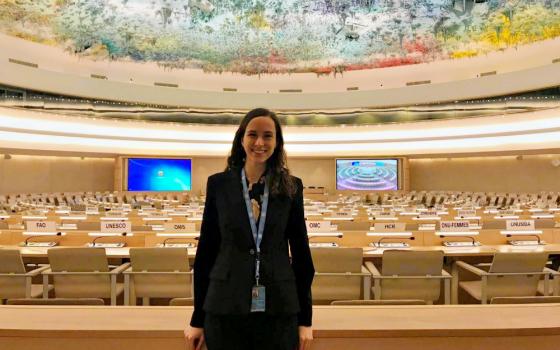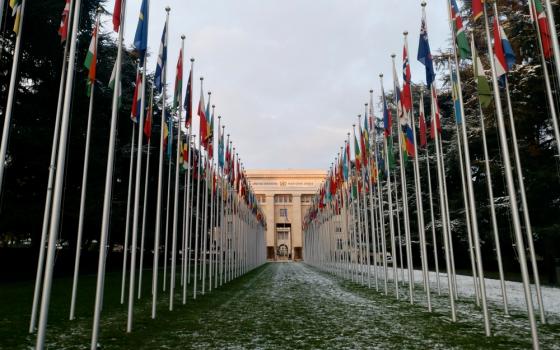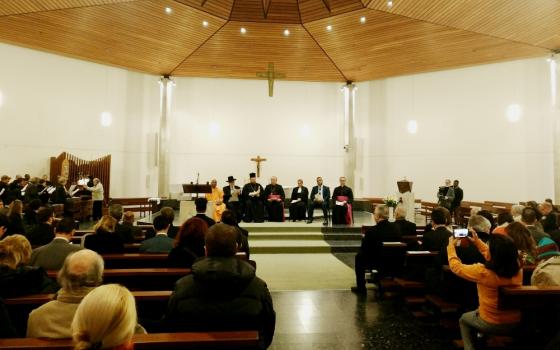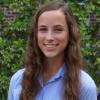Notes from the Field includes reports from young people volunteering in ministries of Catholic sisters. A partnership with Catholic Volunteer Network, the project began in the summer of 2015. This is our eighth round of bloggers: Sarabella Muise is a Good Shepherd Volunteer in New York City, and Julianna Lewis is a VIDES+USA volunteer who just completed her first assignment in Bogotá, Colombia. She is now in Geneva, at her second placement site with VIDES+USA at the Istituto Internazionale Maria Ausiliatrice Human Rights Office, which has special consultative status with the United Nations. This is Julianna's seventh blog post. Read more about her.
______
I have now been in Switzerland for the better part of a month and one of the hardest things so far has been figuring out: How does God play into my daily work for Istituto Internazionale Maria Ausiliatrice Human Rights Office and VIDES — other than the fact that I am representing two religious organizations?
Some background first: There really is no such thing as a typical day here because most of what I do depends on what types of sessions are going on at the United Nations. (The U.N.'s headquarters are in New York, but the global body has a substantial presence in Geneva.) Some days, I work at my desk in the office in quaint Veyrier — right outside of Geneva — preparing for upcoming sessions or completing organizational tasks. On other days, I head to the U.N. early in the morning to attend a session and may leave after lunch or stay all day attending a second session.
The human rights office helps represent Salesian sisters in 94 countries around the world. It is committed to defending the human rights of women, youth and children, especially among the most vulnerable of these groups. VIDES is another organization that is also associated with the Salesian sisters present in more than 40 countries. This organization, which defends the right to education and human dignity, helps empower young people through volunteering.
Our role in representing these two organizations is by attending U.N. sessions that correspond to the countries in which Istituto Internazionale Maria Ausiliatrice or VIDES has a presence. We report on what was discussed at the sessions and if any of the organizations' submissions were taken into consideration. These reports are then sent to the members — sisters, volunteers or other stakeholders — of the corresponding country so that they have an idea of the human rights issues discussed at the international level in their home country.
Aside from all of the technical details, the experience of working among ambassadors, diplomats and representatives at the U.N. is intriguing. It is possible to see the complex relationships between countries and the politics that go into every statement delivered. And it can feel momentous to sit among representatives of many of the member states from all over the world joined together in one room, civilly discussing the most pressing human rights issues of our time.
But despite the first impressions of grandeur and awe, an observer quickly realizes the slow pace of the U.N.'s proceedings. Important strides are not, and cannot be, taken overnight. Dialogue, discussion and compromise are all a process that requires much time and participation from U.N. member states.
Sitting in an office most days, reading technical and political reports and dense documents, hardly seemed like the idea of service I had envisioned as a volunteer. And it made me wonder: How can I possibly recognize God in all of this?
I still do not have a concrete answer to this question, but I had an opportunity to attend an event recently that helped me begin to understand how.
The Permanent Observer Mission of the Holy See to the United Nations in Geneva hosted an interreligious dialogue on peace this past week that I and many other people of faith attended. The meeting included participation by Catholics, Buddhists, Protestants, Jews and Muslims, and provided leaders from each of these communities the chance to speak on the recent World Day of Peace, which is always Jan. 1. Participants were asked their thoughts on Pope Francis' reflection for that day, which was appropriately titled "Good politics is at the service of peace."
In his message, the pope details how peace must be achieved through the important work of politicians and leaders from countries all around the world. Francis cited Pope Benedict XVI's notion of work: "Man's earthly activity, when inspired and sustained by charity, contributes to the building of the universal city of God, which is the goal of the history of the human family," Benedict wrote in his encyclical Caritas in Veritate.
This notion really struck me. Prior to working in Switzerland, it was always easy for me to recognize how my interest and work in the field of health affected the lives of those I cared for. It was apparent to me how caring for another person "hands-on" is directly related to serving God and glorifying God through such work.
When I got here, though, I was suddenly confused about how my work behind a computer reading documents could be equally at the service of God and even the sisters, volunteers and others I am supposed to be representing. Reflecting on this, I am glad that I just had my experience volunteering with the Salesian sisters in Colombia and assisting in some of their ministries there. Having had that experience, I at least have exposure to some of the members and on-the-ground work that these organizations represent and do.
With this in mind, and after having attended this event and hearing the reflections of countless religious leaders on politics and peace, I am coming to better understand the role of politics and of the United Nations in the glorification of God.
My unique position as a person of faith and as a volunteer with these organizations at the U.N. is helping me see what Benedict meant in Caritas in Veritate when he said, "When animated by charity, commitment to the common good has greater worth than a merely secular and political stand would have."
It may be harder to recognize this "greater worth" in my work here — office work can feel routine. But work behind a desk contributes, even in a small way, to the efforts to improve the world. I am coming to better understand this and remember this sentiment, along with my volunteer work with the sisters in Colombia and Salesian ministries, in the moments when the work feels difficult and detached.
[Julianna Lewis is a VIDES+USA volunteer working at the Istituto Internazionale Maria Ausiliatrice Human Rights Office.]



